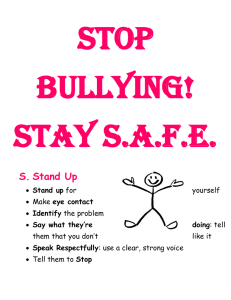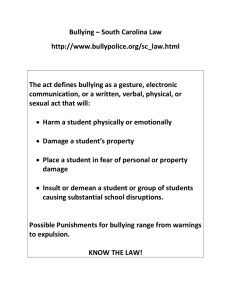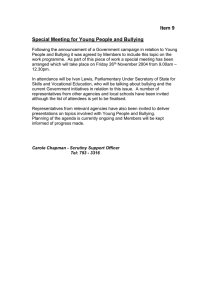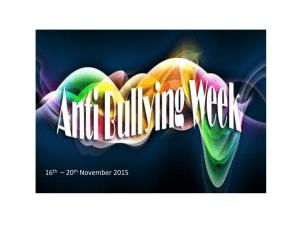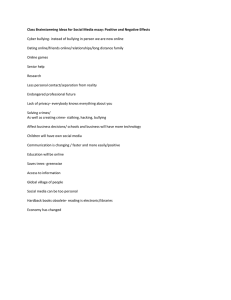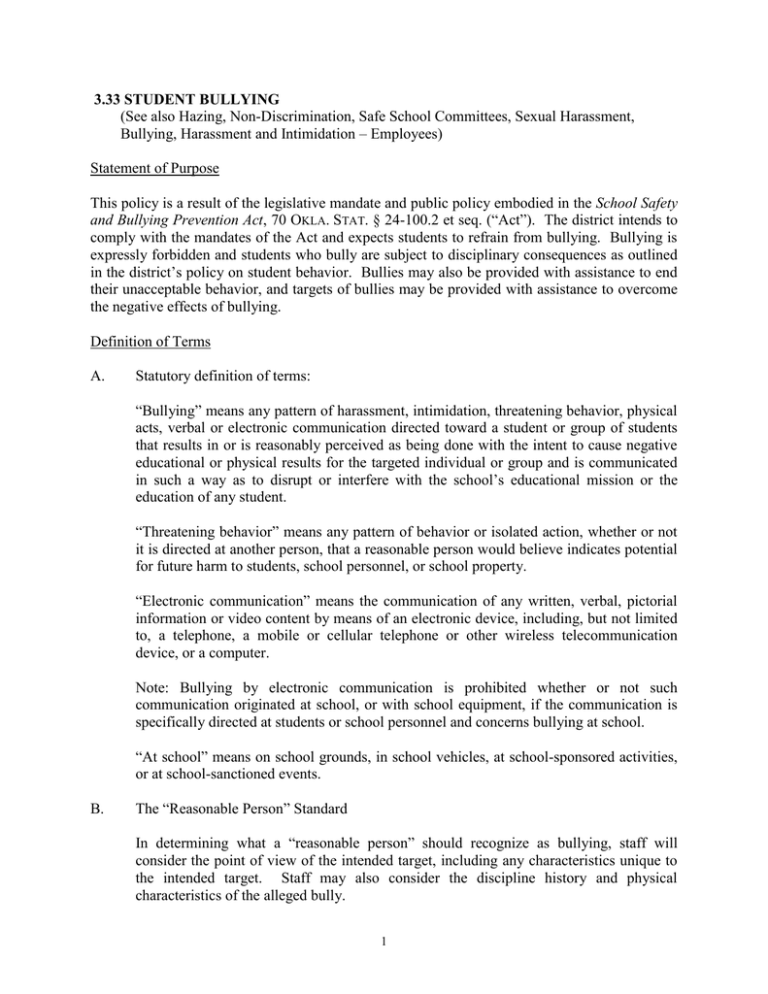
3.33 STUDENT BULLYING
(See also Hazing, Non-Discrimination, Safe School Committees, Sexual Harassment,
Bullying, Harassment and Intimidation – Employees)
Statement of Purpose
This policy is a result of the legislative mandate and public policy embodied in the School Safety
and Bullying Prevention Act, 70 OKLA. STAT. § 24-100.2 et seq. (“Act”). The district intends to
comply with the mandates of the Act and expects students to refrain from bullying. Bullying is
expressly forbidden and students who bully are subject to disciplinary consequences as outlined
in the district’s policy on student behavior. Bullies may also be provided with assistance to end
their unacceptable behavior, and targets of bullies may be provided with assistance to overcome
the negative effects of bullying.
Definition of Terms
A.
Statutory definition of terms:
“Bullying” means any pattern of harassment, intimidation, threatening behavior, physical
acts, verbal or electronic communication directed toward a student or group of students
that results in or is reasonably perceived as being done with the intent to cause negative
educational or physical results for the targeted individual or group and is communicated
in such a way as to disrupt or interfere with the school’s educational mission or the
education of any student.
“Threatening behavior” means any pattern of behavior or isolated action, whether or not
it is directed at another person, that a reasonable person would believe indicates potential
for future harm to students, school personnel, or school property.
“Electronic communication” means the communication of any written, verbal, pictorial
information or video content by means of an electronic device, including, but not limited
to, a telephone, a mobile or cellular telephone or other wireless telecommunication
device, or a computer.
Note: Bullying by electronic communication is prohibited whether or not such
communication originated at school, or with school equipment, if the communication is
specifically directed at students or school personnel and concerns bullying at school.
“At school” means on school grounds, in school vehicles, at school-sponsored activities,
or at school-sanctioned events.
B.
The “Reasonable Person” Standard
In determining what a “reasonable person” should recognize as bullying, staff will
consider the point of view of the intended target, including any characteristics unique to
the intended target. Staff may also consider the discipline history and physical
characteristics of the alleged bully.
1
C.
Types of Bullying
“Physical Bullying” includes harm or threatened harm to another’s body or property,
including but not limited to threats, tripping, hitting, pushing, pinching, pulling hair,
kicking, biting, starting fights, daring others to fight, stealing or destroying property,
extortion, assaults with a weapon, other violent acts, and homicide.
“Emotional Bullying” includes the intentional infliction of harm to another’s self-esteem,
including but not limited to insulting or profane remarks or gestures, or harassing and
frightening statements.
“Social Bullying” includes harm to another’s group acceptance, including but not limited
to gossiping; spreading negative rumors to cause a targeted person to be socially
excluded, ridiculed, or otherwise lose status; acts designed to publicly embarrass a
targeted person, damage the target’s current relationships, or deprive the target of selfconfidence or the respect of peers.
“Sexual Bullying” includes harm of a sexual nature, including but not limited to making
unwelcome sexual comments or gestures to or about the targeted person; creating or
distributing vulgar, profane or lewd words or images about the target; committing a
sexual act at school, including touching private parts of the target’s body; engaging in
off-campus dating violence that adversely affects the target’s education opportunities;
making threatening sexual statements directed at or about the target; or gossiping about
the target’s sexuality or sex life. Such conduct may also constitute sexual harassment
which is prohibited by the district.
Understanding and Preventing Bullying
A.
Student and Staff Education and Training
A full copy of this policy will be posted on the district’s website along with an annual
notice of the availability of the policy. The policy will be included in all district
handbooks and written notice of the policy will be posted at various places in all district
school sites.
All staff will receive annual training regarding preventing, identifying, reporting, and
managing bullying. The district’s bullying coordinator and administrators and/or
counselors will receive additional training regarding appropriate consequences and
remedial action for bullies, helping targets of bullies, and the district’s strategy for
counseling and referral for those affected by bullying.
Students will receive annual education regarding behavioral expectations, understanding
bullying and its negative effects, disciplinary consequences for infractions, reporting
methods, and consequences for those who knowingly make false reports. Parents and
guardians may participate in a parent education component.
B.
Safe School Committees
2
Each Safe School Committee has the responsibility of studying and making recommendations
regarding unsafe conditions, strategies for students to avoid harm at school, student
victimization, crime prevention, school violence, and other issues which interfere with and
adversely affect school safety.
With respect to student bullying, each Committee shall assist the board in promoting a positive
school climate through planning, implementing and evaluating effective prevention, readiness
and response strategies.
Student Reporting
Students are encouraged to inform school personnel if they are the target of or a witness to
bullying. To make a report, students should notify a teacher, counselor, or principal. The
employee will give the student a bullying report form, and will help the student complete the
form, if needed.
Students may make an anonymous report of bullying, and such report will be investigated as
thoroughly as possible. However, it is often difficult to fully investigate claims which are made
anonymously and disciplinary action cannot be taken against a bully solely on the basis of an
anonymous report.
Staff Reporting
Staff members will encourage students to report bullying. All employees are required to report
acts of bullying to the school principal. Any staff member who witnesses, hears about, or
suspects bullying is required to submit a report.
Bullying Investigators
The principal or designee will investigate bullying reports. These individuals will be identified
in the site’s student and staff handbooks, on the district’s website, and in the bullying prevention
education provided annually to students and staff. The district’s anti-bullying program is
coordinated at the district level by the Assistant Superintendent for Student Services, who
provides oversight for the bullying coordinator, the District Student Assistance Program
Coordinator.
Investigating Bullying Reports
When specific allegations of harassment of a sexual, racial, or religious nature, or due to a
disability are filed, the Office of Human Resources will conduct a thorough investigation. For
other alleged incidents of bullying reported to school officials, the principal or designee will
investigate the alleged incident(s) and determine whether bullying occurred, the severity of the
incident(s), and the potential for future violence.
In conducting an investigation, the designated official shall interview relevant students and staff
and review any documentation of the alleged incident(s). School officials may also work with
3
outside professionals, such as local law enforcement, as deemed appropriate by the investigating
official. In the event the investigator believes a criminal act may have been committed or there
is a likelihood of violence, the investigator will immediately call local law enforcement and the
superintendent.
At the conclusion of the investigation, the designated employee will document the steps taken to
review the matter, the conclusions reached and any additional action taken, if applicable.
Further, the investigator will notify the district’s bullying coordinator that an investigation has
occurred and the results of the investigation.
Upon completion of an investigation, the school may recommend that available community
mental health care or substance abuse options be provided to a student, if appropriate. The
school may provide a student with information about the types of support services available to
the student bully, target, and any other students affected by the prohibited behavior. These
resources will be provided to any individual who requests such assistance or will be provided if a
school official believes the resource might be of assistance to the student/family. The district is
not responsible for paying for these services. No school employee is expected to evaluate the
appropriateness or the quality of the resource provided, nor is any employee required to provide
an exhaustive list of resources available. All school employees will act in good faith.
The school may request the disclosure of information concerning students who have received
substance abuse or mental health care (pursuant to the previous paragraph) if that information
indicates an explicit threat to the safety of students or school personnel, provided the disclosure
of the information does not violate the requirements and provisions of any applicable state or
federal laws regarding the disclosure of confidential information. The school may request the
disclosure of information when it is believed that the student may have posed a danger to
him/herself and having such information will allow school officials to determine if it is safe for
the student to return to the regular classroom or if alternative education arrangements are needed.
Parental Notification
The principal or designee will notify the parents of a target within one school day that a bullying
report has been received. Within one school day of the conclusion of the investigation, the
investigator will provide the parents of a target with the results of the investigation and any
community resources deemed appropriate to the situation.
If the report of bullying is substantiated, within one school day of the conclusion of the
investigation, the principal or designee will contact the parents of the bully to discuss
disciplinary action and any community resources deemed appropriate to the situation.
The timelines in this parental notification section may be reasonably extended if individual
circumstances warrant such an extension.
Parental Responsibilities
All parents/guardians will be informed in writing of the district’s program to stop bullying and
will be given a copy of this policy upon request. An administrative response to a reported act of
bullying may involve certain actions to be taken by parents. Parents will be informed of the
4
program and the means for students to report bullying acts toward them or other students. They
will also be told that to help prevent bullying at school they should encourage their children to:
▪
Report bullying when it occurs;
▪
Take advantage of opportunities to talk to their children about bullying;
▪
Inform the school immediately if they think their child is being bullied or is
bullying other students;
▪
Watch for symptoms that their child may be a target of bullying and report those
symptoms; and
▪
Cooperate fully with school personnel in identifying and resolving incidents.
Student Transfers
Students who are victims of bullying, and who report the incident(s) to school administrators,
may choose to transfer to another school district. Any application for transfer must be made in
accordance with the receiving school district’s transfer policy.
5

